- Home
- Alice Munro
The Moons of Jupiter Page 2
The Moons of Jupiter Read online
Page 2
Once they decided to sing a round.
Row, row, row your boat
Gently down the stream,
Merrily, merrily, merrily, merrily,
Life is but a dream.
They didn’t think Dalgleish was real. They drove uptown and reported on the oddity of the shopkeepers; they imitated things they had overheard on the street. Every morning the coffee they had brought filled the house with its unfamiliar, American fragrance, and they sat around asking who had an inspiration for the day. One inspiration was to drive out into the country and pick berries. They got scratched and overheated and at one point Winifred was completely penned in, immobilized, by thorny branches, bellowing for a rescue party; nevertheless they said they had mightily enjoyed themselves. Another inspiration was to take my father’s fishing-rods and go down to the river. They came home with a catch of rock bass, a fish we generally threw back. They organized picnics. They dressed up in old clothes, in old straw hats and my father’s overalls, and took pictures of each other. They made layer cakes, and marvelous molded salads which were shaped like temples and colored like jewels.
One afternoon they put on a concert. Iris was an opera singer. She took the cloth off the dining-room table to drape herself in, and sent me out to collect hen feathers to put in her hair. She sang “The Indian Love Call,” and “Women Are Fickle.” Winifred was a bank-robber, with a water-pistol she had bought at the five-and-ten. Everybody had to do something. My sister and I sang, two songs: “Yellow Rose of Texas,” and the Doxology. My mother, most amazingly, put on a pair of my father’s trousers and stood on her head.
Audience and performers, the cousins were for each other, every waking moment. And sometimes asleep. Flora was the one who talked in her sleep. Since she was also the most ladylike and careful, the others stayed awake to ask her questions, trying to make her say something that would embarrass her. They told her she swore. They said she sat bolt upright and demanded, “Why is there no damned chalk?”
She was the one I liked least because she attempted to sharpen our minds—my sister’s and mine—by throwing out mental-arithmetic questions. “If it took seven minutes to walk seven blocks, and five blocks were the same length but the other two blocks were double the length—”
“Oh, go soak your head, Flora!” said Iris, who was the rudest.
If they didn’t get any inspiration, or it was too hot to do anything, they sat on the verandah drinking lemonade, fruit punch, ginger ale, iced tea, with maraschino cherries and chunks of ice chipped from the big chunk in the icebox. Sometimes my mother prettied up the glasses by dipping the rims in beaten egg whites, then in sugar. The cousins would say they were prostrated, they were good for nothing; but their complaints had a gratified sound, as if the heat of summer itself had been created to add drama to their lives.
DRAMA ENOUGH already.
In the larger world, things had happened to them. Accidents, proposals, encounters with lunatics and enemies. Iris could have been rich. A millionaire’s widow, a crazy old woman with a wig like a haystack, had been wheeled into the hospital one day, clutching a carpetbag. And what was in the carpetbag but jewels, real jewels, emeralds and diamonds and pearls as big as pullet eggs. Nobody but Iris could do a thing with her. It was Iris who persuaded her at last to throw the wig into the garbage (it was crawling with fleas), and let the jewels go into the bank vault. So attached did this old woman become to Iris that she wanted to remake her will, she wanted to leave Iris the jewels and the stocks and the money and the apartment houses. Iris would not allow it. Professional ethics ruled it out.
“You are in a position of trust. A nurse is in a position of trust.” Then she told how she had been proposed to by an actor, dying from a life of dissipation. She allowed him to swig from a Listerine bottle because she didn’t see what difference it would make. He was a stage actor, so we wouldn’t recognize the name even if she told us, which she wouldn’t.
She had seen other big names, too, celebrities, the top society of Philadelphia. Not at their best.
Winifred said that she had seen things too. The real truth, the real horrible truth about some of those big wheels and socialites came out when you got a look at their finances.
WE LIVED at the end of a road running west from Dalgleish over some scrubby land where there were small wooden houses and flocks of chickens and children. The land rose to a decent height where we were and then sloped in wide fields and pastures, decorated with elm trees, down to the curve of the river. Our house was decent too, an old brick house of a fair size, but it was drafty and laid out in an inconvenient way and the trim needed paint. My mother planned to fix it up and change it all around, as soon as we got some money.
My mother did not think much of the town of Dalgleish. She was often harking back, to the town of Fork Mills, in the Ottawa Valley, where she and the cousins had gone to high school, the town their grandfather had come to from England; and to England itself, which of course she had never seen. She praised Fork Mills for its stone houses, its handsome and restrained public buildings (quite different, she said, from Huron County’s, where the idea had been to throw up some brick monstrosity and stick a tower on it), for its paved streets, the service in its stores, the better quality of things for sale and the better class of people. The people who thought so highly of themselves in Dalgleish would be laughable to the leading families of Fork Mills. But then, the leading families of Fork Mills would themselves be humbled if they came into contact with certain families of England, to whom my mother was connected.
Connection. That was what it was all about. The cousins were a show in themselves, but they also provided a connection. A connection with the real, and prodigal, and dangerous, world.
They knew how to get on in it, they had made it take notice. They could command a classroom, a maternity ward, the public; they knew how to deal with taxi drivers and train conductors.
The other connection they provided, and my mother provided as well, was to England and history. It is a fact that Canadians of Scottish—which in Huron County we called Scotch—and Irish descent will tell you quite freely that their ancestors came out during the potato famine, with only the rags on their backs, or that they were shepherds, agricultural laborers, poor landless people. But anyone whose ancestors came from England will have some story of black sheep or younger sons, financial reverses, lost inheritances, elopements with unsuitable partners. There may be some amount of truth in this; conditions in Scotland and Ireland were such as to force wholesale emigration, while Englishmen may have chosen to leave home for more colorful, personal reasons.
This was the case with the Chaddeley family, my mother’s family. Isabel and Iris were not Chaddeleys by name, but their mother had been a Chaddeley; my mother had been a Chaddeley, though she was now a Fleming; Flora and Winifred were Chaddeleys still. All were descended from a grandfather who left England as a young man for reasons they did not quite agree on. My mother believed that he had been a student at Oxford, but had lost all the money his family sent him, and had been ashamed to go home. He lost it by gambling. No, said Isabel, that was just the story; what really happened was that he got a servant girl in trouble and was compelled to marry her, and take her to Canada. The family estates were near Canterbury, said my mother. (Canterbury pilgrims, Canterbury bells.) The others were not sure of that. Flora said that they were in the west of England, and that the name Chaddeley was said to be related to Cholmondeley; there was a Lord Cholmondeley, the Chaddeleys could be a branch of that family. But there was also the possibility, she said, that it was French, it was originally Champ de laiche, which means field of sedge. In that case the family had probably come to England with William the Conqueror.
Isabel said she was not an intellectual and the only person she knew from English history was Mary Queen of Scots. She wanted somebody to tell her if William the Conqueror came before Mary Queen of Scots, or after?
“Sedge fields,” said my father agreeably. “That would
n’t exactly make them a fortune.”
“Well, I wouldn’t know sedge from oats,” said Iris. “But they were prosperous enough in England, according to Grandpa, they were gentry there.”
“Before,” said Flora, “and Mary Queen of Scots wasn’t even English.”
“I knew that from the name,” said Isabel. “So ha-ha.”
Every one of them believed, whatever the details, that there had been a great comedown, a dim catastrophe, and that beyond them, behind them, in England, lay lands and houses and ease and honor. How could they think otherwise, remembering their grandfather?
He had worked as a postal clerk, in Fork Mills. His wife, whether she was a seduced servant or not, bore him eight children, then died. As soon as the older children were out to work and contributing money to the household—there was no nonsense about educating them—the father quit work. A fight with the Postmaster was the immediate reason, but he really had no intention of working any longer; he had made up his mind to stay at home, supported by his children. He had the air of a gentleman, was widely read, and full of rhetoric and self-esteem. His children did not balk at supporting him; they sank into their commonplace jobs, but pushed their own children—they limited themselves to one or two apiece, mostly daughters—out to Business School, to Normal School, to Nurses Training. My mother and her cousins, who were these children, talked often about their selfish and wilful grandfather, hardly ever about their decent, hard-working parents. What an old snob he was, they said, but how handsome, even as an old man, what a carriage. What ready and appropriate insults he had for people, what scathing judgements he could make. Once, in faraway Toronto, on the main floor of Eaton’s as a matter of fact, he was accosted by the harness-maker’s wife from Fork Mills, a harmless, brainless woman who cried, “Well, ain’t it nice to meet a friend so far from home?”
“Madam,” said Grandfather Chaddeley, “you are no friend of mine.” Wasn’t he the limit, they said. Madam, you are no friend of mine!
The old snob. He paraded around with his head in the air like a prize gander. Another lower-class lady—lower-class according to him— was kind enough to bring him some soup, when he had caught cold. Sitting in his daughter’s kitchen, not even his own roof over his head, soaking his feet, an ailing and in fact a dying man, he still had the gall to turn his back, let his daughter do the thanking. He despised the woman, whose grammar was terrible, and who had no teeth.
“But he didn’t either! By that time he had no teeth whatever!” “Pretentious old coot.”
“And a leech on his children.”
“Just pride and vanity. That’s the sum total of him.”
But telling these stories, laughing, they were billowing with pride themselves, they were crowing. They were proud of having such a grandfather. They believed that refusing to speak to inferior people was outrageous and mean, that preserving a sense of distinction was ridiculous, particularly when your teeth were gone, but in a way they still admired him. They did. They admired his invective, which was lost on his boss, the plodding Postmaster, and his prideful behavior, which was lost on his neighbors, the democratic citizens of Canada. (Oh what a shame, said the toothless neighbor, the poor old fellow, he don’t even reckinize me.) They might even have admired his decision to let others do the work. A gentleman, they called him. They spoke ironically, but the possession of such a grandfather continued to delight them.
I couldn’t understand this, at the time or later. I had too much Scottish blood in me, too much of my father. My father would never have admitted there were inferior people, or superior people either. He was scrupulously egalitarian, making it a point not to “snivel,” as he said, to anybody, not to kowtow, and not to high-hat anybody, either, to behave as if there were no differences. I took the same tack. There were times, later, when I wondered if it was a paralyzing prudence that urged this stand, as much as any finer sentiment, when I wondered if my father and I didn’t harbor, in our hearts, intact and unassailable notions of superiority, which my mother and her cousins with their innocent snobbishness could never match.
IT WAS NOT of much importance to me, years later, to receive a letter from the Chaddeley family, in England. It was from an elderly lady who was working on a family tree. The family did exist, in England, after all, and they did not spurn their overseas branches, they were seeking us out. My great-grandfather was known to them. There was his name on the family tree: Joseph Ellington Chaddeley. The marriage register gave his occupation as butcher’s apprentice. He had married Helena Rose Armour, a servant, in 1859. So it was true that he had married a servant. But probably not true about the gaming debts at Oxford. Did gentlemen who were embarrassed at Oxford go and apprentice themselves to butchers?
It occurred to me that if he had stayed with butchering, his children might have gone to high school. He might have been a prosperous man in Fork Mills. The letter-writer did not mention the Cholmondeley connection, or the fields of sedge, or William the Conqueror. It was a decent family we belonged to, of servants and artisans, the occasional tradesman or farmer. At one time I would have been shocked to discover this, and would hardly have believed it. At another, later, time, when I was dedicated to tearing away all false notions, all illusions, I would have been triumphant. By the time the revelation came I did not care, one way or the other. I had almost forgotten about Canterbury and Oxford and Cholmondeley, and that first England I had heard of from my mother, that ancient land of harmony and chivalry, of people on horseback, and good manners (though surely my grandfather’s had broken, under the strain of a cruder life), of Simon de Montfort and Lorna Doone and hounds and castles and the New Forest, all fresh and rural, ceremonious, civilized, eternally desirable.
And I had already had my eyes opened to some other things, by the visit of Cousin Iris.
That happened when I was living in Vancouver. I was married to Richard then. I had two small children. On a Saturday evening Richard answered the phone and came to get me.
“Be careful,” he said. “It sounds like Dalgleish.”
Richard always said the name of my native town as if it were a clot of something unpleasant, which he had to get out of his mouth in a hurry.
I went to the phone and found to my relief that it was nobody from Dalgleish at all. It was Cousin Iris. There was a bit of the Ottawa Valley accent still in her speech, something rural—she would not have suspected that herself and would not have been pleased—and something loud and jolly, which had made Richard think of the voices of Dalgleish. She said that she was in Vancouver, she was retired now and she was taking a trip, and she was dying to see me. I asked her to come to dinner the next day.
“Now, by dinner, you mean the evening meal, don’t you?”
“Yes.”
“I just wanted to get it straight. Because when we visited at your place, remember, your folks always had dinner at noon. You called the noon meal dinner. I didn’t think you still would but I wanted to get it straight.”
I told Richard that a cousin of my mother’s was coming to dinner. I said she was, or had been, a nurse, and that she lived in Philadelphia.
“She’s all right,” I said. I meant decently educated, well enough spoken, moderately well-bred. “She’s travelled all over. She’s really quite interesting. Being a nurse she’s met all sorts of people—” I told about the millionaire’s widow and the jewels in the carpetbag. And the more I talked, the more Richard discerned of my doubts and my need for reassurance, and the more noncommittal and unreassuring he became. He knew he had an advantage, and we had reached the point in our marriage where no advantage was given up easily.
I longed for the visit to go well. I wanted this for my own sake. My motives were not such as would do me credit. I wanted Cousin Iris to shine forth as a relative nobody need be ashamed of, and I wanted Richard and his money and our house to lift me forever, in Cousin Iris’s eyes, out of the category of poor relation. I wanted all this accomplished with a decent subtlety and restraint and the re
sult to be a pleasant recognition of my own value, from both sides.
I used to think that if I could produce one rich and well-behaved and important relative, Richard’s attitude to me would change. A judge, a surgeon, would have done very well. I was not sure at all how Iris would serve, as a substitute. I was worried about the way Richard had said Dalgleish, and that vestige of the Ottawa Valley—Richard was stern about rural accents, having had so much trouble with mine—and something else in Iris’s voice which I could not identify. Was she too eager? Did she assume some proprietary family claim I no longer believed was justified?
Never mind. I started thawing a leg of lamb and made a lemon meringue pie. Lemon meringue pie was what my mother made when the cousins were coming. She polished the dessert forks, she ironed the table napkins. For we owned dessert forks (I wanted to say to Richard); yes, and we had table napkins, even though the toilet was in the basement and there was no running water until after the war. I used to carry hot water to the front bedroom in the morning, so that the cousins could wash. I poured it into a jug like those I now see in antique stores, or on hall tables, full of ornamental grasses.
But surely none of this mattered to me, none of this nonsense about dessert forks? Was I, am I, the sort of person who thinks that to possess such objects is to have a civilized attitude to life? No, not at all; not exactly; yes and no. Yes and no. Background was Richard’s word. Your background. A drop in his voice, a warning. Or was that what I heard, not what he meant? When he said Dalgleish, even when he wordlessly handed me a letter from home, I felt ashamed, as if there was something growing over me; mold, something nasty and dreary and inescapable. Poverty, to Richard’s family, was like bad breath or running sores, an affliction for which the afflicted must bear one part of the blame. But it was not good manners to notice. If ever I said anything about my childhood or my family in their company there would be a slight drawing-back, as at a low-level obscenity. But it is possible that I was a bit strident and self-conscious, like the underbred character in Virginia Woolf who makes a point of not having been taken to the circus. Perhaps that was what embarrassed them. They were tactful with me. Richard could not afford to be so tactful, since he had put himself in a chancy position, marrying me. He wanted me amputated from that past which seemed to him such shabby baggage; he was on the lookout for signs that the amputation was not complete; and of course it wasn’t.

 Runaway
Runaway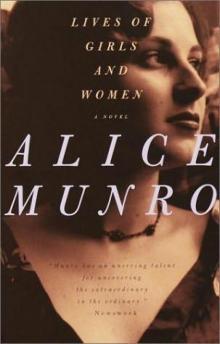 Lives of Girls and Women
Lives of Girls and Women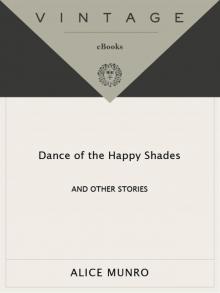 Dance of the Happy Shades
Dance of the Happy Shades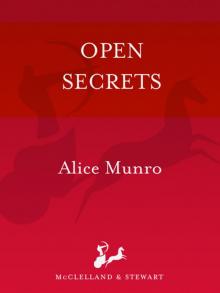 Open Secrets
Open Secrets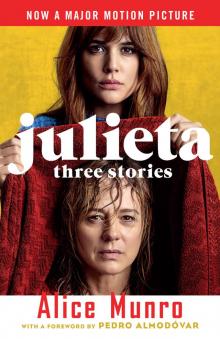 Julieta (Movie Tie-in Edition)
Julieta (Movie Tie-in Edition)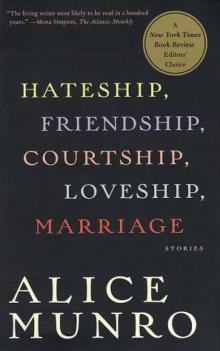 Hateship, Friendship, Courtship, Loveship, Marriage: Stories
Hateship, Friendship, Courtship, Loveship, Marriage: Stories Alice Munro's Best
Alice Munro's Best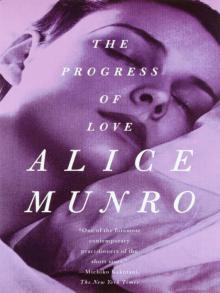 The Progress of Love
The Progress of Love Selected Stories
Selected Stories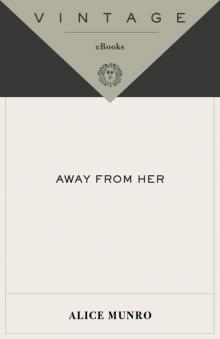 Away from Her
Away from Her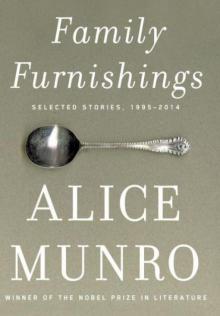 Family Furnishings
Family Furnishings Moons of Jupiter
Moons of Jupiter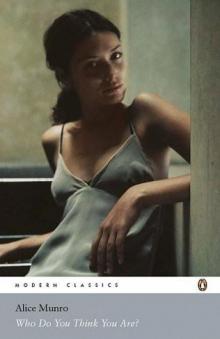 Who Do You Think You Are?
Who Do You Think You Are?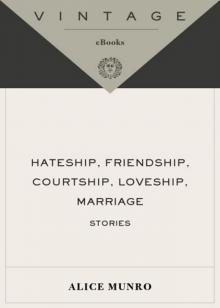 Hateship, Friendship, Courtship, Loveship, Marriage
Hateship, Friendship, Courtship, Loveship, Marriage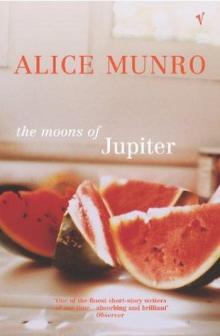 The Moons of Jupiter
The Moons of Jupiter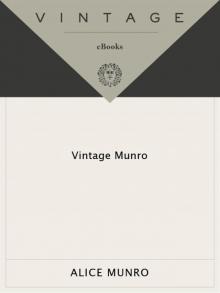 Vintage Munro
Vintage Munro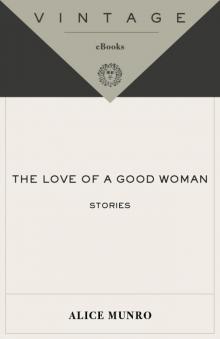 The Love of a Good Woman
The Love of a Good Woman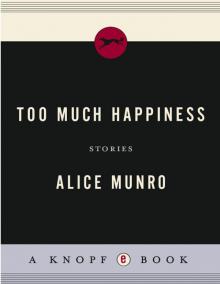 Too Much Happiness
Too Much Happiness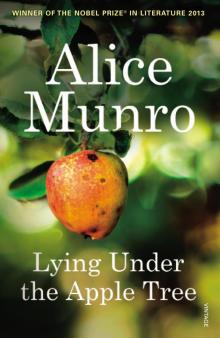 Lying Under the Apple Tree
Lying Under the Apple Tree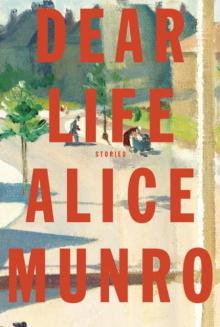 Dear Life
Dear Life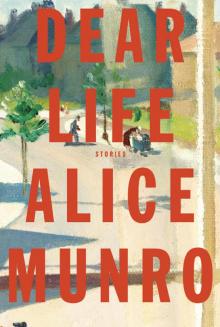 Dear Life: Stories
Dear Life: Stories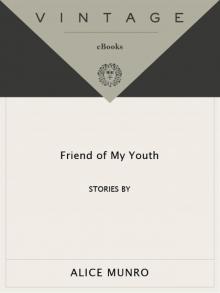 Friend of My Youth
Friend of My Youth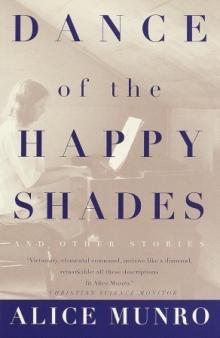 Dance of the Happy Shades: And Other Stories
Dance of the Happy Shades: And Other Stories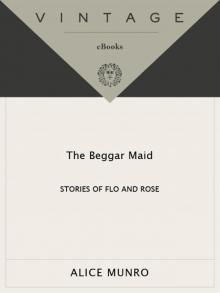 The Beggar Maid
The Beggar Maid